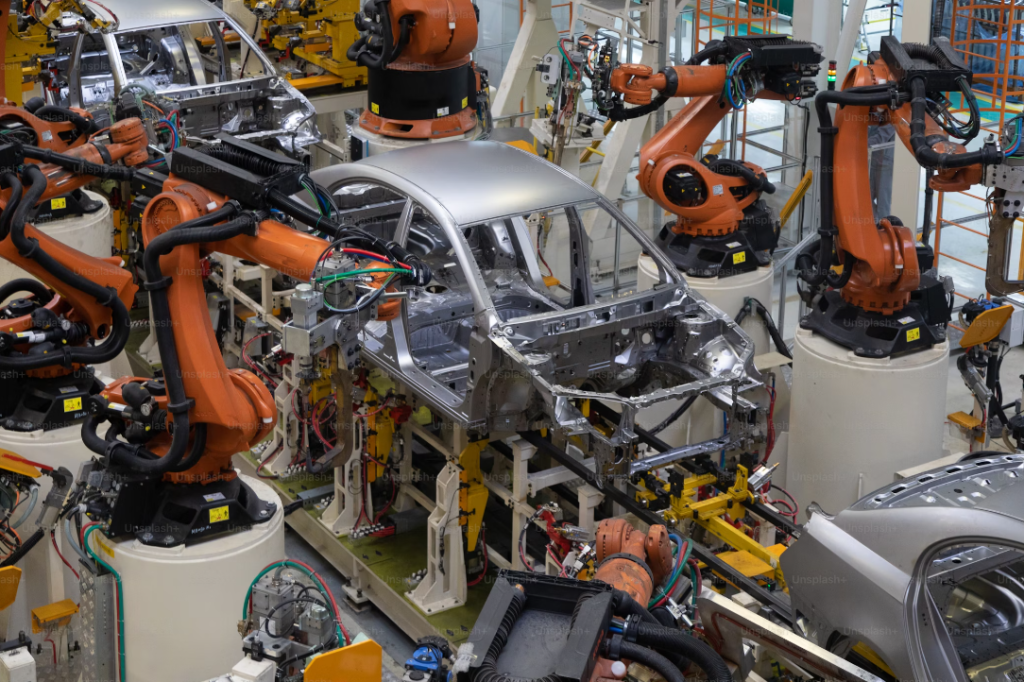The automotive industry is undergoing a profound transformation, driven by the integration of artificial intelligence (AI) technologies. As cars evolve from mere transportation tools to smart vehicles equipped with advanced features, AI is at the forefront, enhancing innovation, safety, and the overall driving experience. This article explores how AI is reshaping the automotive landscape, focusing on autonomous driving, advanced driver-assistance systems (ADAS), predictive maintenance, and enhanced manufacturing processes.
1. Autonomous Driving: The Future of Mobility
One of the most significant advancements in the automotive sector is the development of autonomous vehicles. AI is the backbone of self-driving technology, enabling vehicles to navigate and operate without human intervention. Companies like Tesla, Waymo, and Ford are investing heavily in AI to make autonomous driving a reality.
Machine Learning and Computer Vision
At the core of autonomous driving are machine learning algorithms and computer vision systems. These technologies allow vehicles to process data from various sensors, including cameras, lidar, and radar, to understand their surroundings. For example, AI can identify pedestrians, traffic signs, and road conditions, making real-time decisions based on the information gathered.
Safety and Regulatory Challenges
While autonomous vehicles promise enhanced safety by reducing human error, they also face regulatory hurdles and safety concerns. Ensuring that these vehicles can operate safely in complex urban environments is a significant challenge. AI systems must be rigorously tested to handle various scenarios, such as navigating through heavy traffic, adverse weather conditions, and unexpected obstacles.
2. Advanced Driver-Assistance Systems (ADAS)
AI is also playing a crucial role in enhancing traditional vehicles through advanced driver-assistance systems (ADAS). These systems leverage AI to provide features that improve safety and convenience for drivers.
Collision Avoidance and Emergency Braking
AI-powered collision avoidance systems use real-time data analysis to detect potential hazards and provide warnings to drivers. If the driver does not react in time, the system can automatically apply the brakes to prevent a collision. This technology has the potential to save lives and reduce the severity of accidents.
Lane Keeping and Adaptive Cruise Control
Another critical application of AI in ADAS is lane-keeping assistance and adaptive cruise control. These features help drivers maintain their lane position and adjust their speed according to traffic conditions. AI systems continuously analyze data from cameras and sensors to ensure that vehicles remain safely within their lanes, even in challenging driving situations.
3. Predictive Maintenance: Enhancing Vehicle Longevity
AI is not only transforming how vehicles operate on the road but also how they are maintained. Predictive maintenance is an innovative approach that uses AI to anticipate potential issues before they become critical problems.
Data-Driven Insights
By analyzing data from various vehicle sensors, AI algorithms can identify patterns that indicate when a component may fail. For example, if the engine temperature exceeds normal levels or if there are unusual vibrations, AI can alert drivers to the need for maintenance. This proactive approach helps prevent breakdowns and costly repairs, ultimately enhancing vehicle longevity.
Cost Savings and Efficiency
Predictive maintenance also contributes to cost savings for both manufacturers and consumers. By addressing maintenance needs before they escalate, car owners can avoid unexpected repair bills and prolong the lifespan of their vehicles. Additionally, manufacturers can optimize their supply chains by ensuring that parts are available when needed, reducing downtime for repairs.
4. Enhanced Manufacturing Processes
The automotive manufacturing process is being revolutionized by AI, leading to increased efficiency, quality, and flexibility in production.
Automation and Robotics
AI-driven automation is streamlining various aspects of manufacturing, from assembly lines to quality control. Robots equipped with AI can perform repetitive tasks with precision, reducing the risk of human error. For example, AI systems can monitor production lines in real-time, identifying defects and ensuring that only high-quality components are used.
Supply Chain Optimization
AI also plays a vital role in supply chain management for automotive manufacturers. By analyzing data on demand, inventory levels, and supplier performance, AI can optimize the entire supply chain. This not only improves efficiency but also reduces costs and minimizes waste, ultimately leading to more sustainable production practices.
5. Enhancing Customer Experience
AI is transforming the automotive industry by enhancing customer experience through personalized services and innovative features.
Connected Vehicles and Smart Features
With the rise of connected vehicles, AI enables cars to offer personalized experiences to drivers. AI systems can analyze driver behavior and preferences to provide tailored recommendations, such as optimal routes, preferred playlists, and even vehicle settings. This level of personalization enhances the overall driving experience and fosters brand loyalty.
Customer Service and Support
AI-powered chatbots and virtual assistants are also being used to improve customer service in the automotive sector. These AI systems can assist customers with inquiries about vehicle features, maintenance schedules, and troubleshooting. By providing quick and accurate responses, AI enhances customer satisfaction and streamlines the service process.
6. Ethical Considerations and Challenges
Despite the numerous benefits of AI in the automotive industry, ethical considerations and challenges must be addressed.
Data Privacy and Security
The reliance on AI and data collection raises concerns about privacy and security. Automotive companies must ensure that they handle customer data responsibly and comply with regulations regarding data protection. Building trust with consumers is essential as vehicles become more connected and data-driven.
Bias in AI Algorithms
Another challenge is the potential for bias in AI algorithms. If the data used to train AI systems are not representative of diverse populations, the resulting algorithms may lead to biased outcomes. It is crucial for manufacturers to ensure that their AI systems are developed and tested with diverse datasets to promote fairness and equity.
Conclusion
AI is driving innovation and safety in the automotive industry, reshaping how vehicles are designed, manufactured, and operated. From autonomous driving and advanced driver-assistance systems to predictive maintenance and enhanced customer experiences, AI technologies are revolutionizing the automotive landscape.
As the industry continues to evolve, addressing ethical considerations and challenges will be vital to harnessing the full potential of AI. With ongoing advancements in AI, the future of automotive promises safer, more efficient, and more enjoyable driving experiences for everyone. As we embrace these innovations, the road ahead looks promising, with AI at the helm of automotive transformation.

